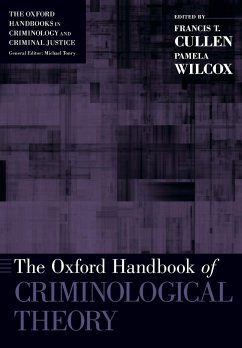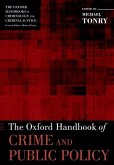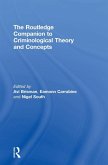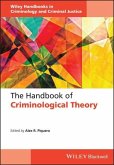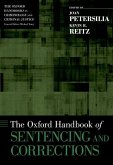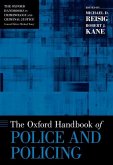The Oxford Handbook of Criminological Theory
Herausgeber: Cullen, Francis T.; Wilcox, Pamela
The Oxford Handbook of Criminological Theory
Herausgeber: Cullen, Francis T.; Wilcox, Pamela
- Broschiertes Buch
- Merkliste
- Auf die Merkliste
- Bewerten Bewerten
- Teilen
- Produkt teilen
- Produkterinnerung
- Produkterinnerung
This Oxford Handbook presents a series of essays that captures not the past of criminology, but where theoretical explanation is headed. As a result, the volume is replete with new ideas, discussions of substantive topics with salient theoretical implications, and reviews and interpretations of literatures that illuminate promising avenues along which theory and research should evolve. Special attention is paid to how criminal participation is shaped intimately by individual traits, diverse social contexts, the situations in which the choice of crime is made, and exposure to coercive experiences.…mehr
Andere Kunden interessierten sich auch für
![The Oxford Handbook of Crime and Public Policy The Oxford Handbook of Crime and Public Policy]() The Oxford Handbook of Crime and Public Policy69,99 €
The Oxford Handbook of Crime and Public Policy69,99 €![Climate Change from a Criminological Perspective Climate Change from a Criminological Perspective]() Climate Change from a Criminological Perspective81,99 €
Climate Change from a Criminological Perspective81,99 €![The Routledge Companion to Criminological Theory and Concepts The Routledge Companion to Criminological Theory and Concepts]() The Routledge Companion to Criminological Theory and Concepts309,99 €
The Routledge Companion to Criminological Theory and Concepts309,99 €![The Handbook of Criminological Theory The Handbook of Criminological Theory]() Alex R PiqueroThe Handbook of Criminological Theory232,99 €
Alex R PiqueroThe Handbook of Criminological Theory232,99 €![Oxford Handbook of Sentencing and Corrections Oxford Handbook of Sentencing and Corrections]() Oxford Handbook of Sentencing and Corrections263,99 €
Oxford Handbook of Sentencing and Corrections263,99 €![Oxford Handbook of Police and Policing Oxford Handbook of Police and Policing]() Oxford Handbook of Police and Policing238,99 €
Oxford Handbook of Police and Policing238,99 €![Oxford Handbook of Forensic Medicine Oxford Handbook of Forensic Medicine]() Guy NorfolkOxford Handbook of Forensic Medicine52,99 €
Guy NorfolkOxford Handbook of Forensic Medicine52,99 €-
-
-
This Oxford Handbook presents a series of essays that captures not the past of criminology, but where theoretical explanation is headed. As a result, the volume is replete with new ideas, discussions of substantive topics with salient theoretical implications, and reviews and interpretations of literatures that illuminate promising avenues along which theory and research should evolve. Special attention is paid to how criminal participation is shaped intimately by individual traits, diverse social contexts, the situations in which the choice of crime is made, and exposure to coercive experiences.
Hinweis: Dieser Artikel kann nur an eine deutsche Lieferadresse ausgeliefert werden.
Hinweis: Dieser Artikel kann nur an eine deutsche Lieferadresse ausgeliefert werden.
Produktdetails
- Produktdetails
- Verlag: Oxford University Press
- Seitenzahl: 756
- Erscheinungstermin: 1. Dezember 2015
- Englisch
- Abmessung: 244mm x 170mm x 40mm
- Gewicht: 1280g
- ISBN-13: 9780190457075
- ISBN-10: 0190457074
- Artikelnr.: 47866279
- Herstellerkennzeichnung
- Books on Demand GmbH
- In de Tarpen 42
- 22848 Norderstedt
- info@bod.de
- 040 53433511
- Verlag: Oxford University Press
- Seitenzahl: 756
- Erscheinungstermin: 1. Dezember 2015
- Englisch
- Abmessung: 244mm x 170mm x 40mm
- Gewicht: 1280g
- ISBN-13: 9780190457075
- ISBN-10: 0190457074
- Artikelnr.: 47866279
- Herstellerkennzeichnung
- Books on Demand GmbH
- In de Tarpen 42
- 22848 Norderstedt
- info@bod.de
- 040 53433511
Francis T. Cullen is Distinguished Research Professor Emeritus and Senior Research Associate in the School of Criminal Justice at the University of Cincinnati. Pamela Wilcox is Professor in the School of Criminal Justice at the University of Cincinnati.
Preface
Contributors
Section 1 Individual and Society
Part I. Biosocial Criminology
1. Revisiting Lombroso
Matt DeLisi
2. Biology and Crime
Melissa Peskin, Yu Gao, Andrea L. Glenn, Anna Rudo-Hutt, Yaling Yang, and
Adrian Raine
3. Parenting and Crime
John Paul Wright and Kevin M. Beaver
Part II. Individuals and Crime
4. The Psychology of Criminal Conduct
Paula Smith
5. Risk Factors and Crime
Emily E. Tanner-Smith, Sandra Jo Wilson, and Mark W. Lipsey
Part III. Social Sources of Offending
6. Social Learning and Crime
Emily Salisbury
7. Hirschi's Criminology
Barbara J. Costello
8. General Strain and Urban Youth Violence
Timothy Brezina and Robert Agnew
9. Social Support and Crime
Matthew D. Makarios and Tara Livelsberger
Part IV. Crime and the Life Course
10. Life-Course-Persistent Offenders
Shawn D. Bushway
11. Change in Offending across the Life Course
Christopher J. Sullivan
12. Two Approaches to Developmental/Life-Course Theorizing
David P. Farrington and Rolf Loeber
Section 2 Contexts of Offending
Part V. Peers, Gangs, and Crime
13. Peer Networks and Crime
Dana L. Haynie and Derek A. Kreager
14. Contemporary Gang Ethnographies
Scott Decker and David Pyrooz
15. Girls, Friends, and Delinquency
Jean Marie McGloin and Stephanie DiPietro
16. Gender and Theories of Delinquency
Stacy De Coster, Karen Heimer, and Samantha R. Cumley
Part VI. Communities and Crime
17. Neighborhood Ties, Control, and Crime
Barbara D. Warner and Audrey C. Clubb
18. Community, Inequality, and Crime
Graham C. Ousey and Matthew R. Lee
19. Street Culture and Crime
Mark T. Berg and Eric A. Stewart
20. The Code of the Suburb and Drug Dealing
Scott Jacques and Richard Wright
Part VII. The American Experience and Crime
21. Social Institutions and Crime
Steven F. Messner, Richard Rosenfeld, and Susanne Karstedt
22. The Market Economy and Crime
Elliott Currie
23. Immigration and Crime
Charis E. Kubrin
Section 3 Choice and Opportunity
Part VIII. Deciding to Offend
24. Choosing Street Crime
Richard Wright and Volkan Topalli
25. Choosing White-Collar Crime
Neal Shover, Andy Hochstetler, and Tage Alalehto
26. Emotions, Choice, and Crime
Michael L. Benson and Tara Livelsberger
Part IX. Opportunity Theories
27. Routine Activity Theory
Arelys Madero-Hernandez and Bonnie S. Fisher
28. The Theory of Target Search
Paul J. Brantingham and Patricia L. Brantingham
29. Crime Places and Place Management
Tamara D. Madensen and John E. Eck
30. Multilevel Criminal Opportunity
Pamela Wilcox, Brooke Miller Gialopsos, and Kenneth C. Land
Section 4 Theories of Power and Punishment
Part X. Critical Criminology
31. Coercion and Crime
Thomas Vander Ven and Mark Colvin
32. Green Criminology
Michael J. Lynch and Paul B. Stretesky
Part XI. Theories of the Criminal Sanction
33. Perceptual Deterrence Theory
Ray Paternoster and Ronet Bachman
34. The Effects of Imprisonment
Cheryl Lero Jonson
35. Coercive Mobility
Natasha A. Frost and Todd R. Clear
Index
Contributors
Section 1 Individual and Society
Part I. Biosocial Criminology
1. Revisiting Lombroso
Matt DeLisi
2. Biology and Crime
Melissa Peskin, Yu Gao, Andrea L. Glenn, Anna Rudo-Hutt, Yaling Yang, and
Adrian Raine
3. Parenting and Crime
John Paul Wright and Kevin M. Beaver
Part II. Individuals and Crime
4. The Psychology of Criminal Conduct
Paula Smith
5. Risk Factors and Crime
Emily E. Tanner-Smith, Sandra Jo Wilson, and Mark W. Lipsey
Part III. Social Sources of Offending
6. Social Learning and Crime
Emily Salisbury
7. Hirschi's Criminology
Barbara J. Costello
8. General Strain and Urban Youth Violence
Timothy Brezina and Robert Agnew
9. Social Support and Crime
Matthew D. Makarios and Tara Livelsberger
Part IV. Crime and the Life Course
10. Life-Course-Persistent Offenders
Shawn D. Bushway
11. Change in Offending across the Life Course
Christopher J. Sullivan
12. Two Approaches to Developmental/Life-Course Theorizing
David P. Farrington and Rolf Loeber
Section 2 Contexts of Offending
Part V. Peers, Gangs, and Crime
13. Peer Networks and Crime
Dana L. Haynie and Derek A. Kreager
14. Contemporary Gang Ethnographies
Scott Decker and David Pyrooz
15. Girls, Friends, and Delinquency
Jean Marie McGloin and Stephanie DiPietro
16. Gender and Theories of Delinquency
Stacy De Coster, Karen Heimer, and Samantha R. Cumley
Part VI. Communities and Crime
17. Neighborhood Ties, Control, and Crime
Barbara D. Warner and Audrey C. Clubb
18. Community, Inequality, and Crime
Graham C. Ousey and Matthew R. Lee
19. Street Culture and Crime
Mark T. Berg and Eric A. Stewart
20. The Code of the Suburb and Drug Dealing
Scott Jacques and Richard Wright
Part VII. The American Experience and Crime
21. Social Institutions and Crime
Steven F. Messner, Richard Rosenfeld, and Susanne Karstedt
22. The Market Economy and Crime
Elliott Currie
23. Immigration and Crime
Charis E. Kubrin
Section 3 Choice and Opportunity
Part VIII. Deciding to Offend
24. Choosing Street Crime
Richard Wright and Volkan Topalli
25. Choosing White-Collar Crime
Neal Shover, Andy Hochstetler, and Tage Alalehto
26. Emotions, Choice, and Crime
Michael L. Benson and Tara Livelsberger
Part IX. Opportunity Theories
27. Routine Activity Theory
Arelys Madero-Hernandez and Bonnie S. Fisher
28. The Theory of Target Search
Paul J. Brantingham and Patricia L. Brantingham
29. Crime Places and Place Management
Tamara D. Madensen and John E. Eck
30. Multilevel Criminal Opportunity
Pamela Wilcox, Brooke Miller Gialopsos, and Kenneth C. Land
Section 4 Theories of Power and Punishment
Part X. Critical Criminology
31. Coercion and Crime
Thomas Vander Ven and Mark Colvin
32. Green Criminology
Michael J. Lynch and Paul B. Stretesky
Part XI. Theories of the Criminal Sanction
33. Perceptual Deterrence Theory
Ray Paternoster and Ronet Bachman
34. The Effects of Imprisonment
Cheryl Lero Jonson
35. Coercive Mobility
Natasha A. Frost and Todd R. Clear
Index
Preface
Contributors
Section 1 Individual and Society
Part I. Biosocial Criminology
1. Revisiting Lombroso
Matt DeLisi
2. Biology and Crime
Melissa Peskin, Yu Gao, Andrea L. Glenn, Anna Rudo-Hutt, Yaling Yang, and
Adrian Raine
3. Parenting and Crime
John Paul Wright and Kevin M. Beaver
Part II. Individuals and Crime
4. The Psychology of Criminal Conduct
Paula Smith
5. Risk Factors and Crime
Emily E. Tanner-Smith, Sandra Jo Wilson, and Mark W. Lipsey
Part III. Social Sources of Offending
6. Social Learning and Crime
Emily Salisbury
7. Hirschi's Criminology
Barbara J. Costello
8. General Strain and Urban Youth Violence
Timothy Brezina and Robert Agnew
9. Social Support and Crime
Matthew D. Makarios and Tara Livelsberger
Part IV. Crime and the Life Course
10. Life-Course-Persistent Offenders
Shawn D. Bushway
11. Change in Offending across the Life Course
Christopher J. Sullivan
12. Two Approaches to Developmental/Life-Course Theorizing
David P. Farrington and Rolf Loeber
Section 2 Contexts of Offending
Part V. Peers, Gangs, and Crime
13. Peer Networks and Crime
Dana L. Haynie and Derek A. Kreager
14. Contemporary Gang Ethnographies
Scott Decker and David Pyrooz
15. Girls, Friends, and Delinquency
Jean Marie McGloin and Stephanie DiPietro
16. Gender and Theories of Delinquency
Stacy De Coster, Karen Heimer, and Samantha R. Cumley
Part VI. Communities and Crime
17. Neighborhood Ties, Control, and Crime
Barbara D. Warner and Audrey C. Clubb
18. Community, Inequality, and Crime
Graham C. Ousey and Matthew R. Lee
19. Street Culture and Crime
Mark T. Berg and Eric A. Stewart
20. The Code of the Suburb and Drug Dealing
Scott Jacques and Richard Wright
Part VII. The American Experience and Crime
21. Social Institutions and Crime
Steven F. Messner, Richard Rosenfeld, and Susanne Karstedt
22. The Market Economy and Crime
Elliott Currie
23. Immigration and Crime
Charis E. Kubrin
Section 3 Choice and Opportunity
Part VIII. Deciding to Offend
24. Choosing Street Crime
Richard Wright and Volkan Topalli
25. Choosing White-Collar Crime
Neal Shover, Andy Hochstetler, and Tage Alalehto
26. Emotions, Choice, and Crime
Michael L. Benson and Tara Livelsberger
Part IX. Opportunity Theories
27. Routine Activity Theory
Arelys Madero-Hernandez and Bonnie S. Fisher
28. The Theory of Target Search
Paul J. Brantingham and Patricia L. Brantingham
29. Crime Places and Place Management
Tamara D. Madensen and John E. Eck
30. Multilevel Criminal Opportunity
Pamela Wilcox, Brooke Miller Gialopsos, and Kenneth C. Land
Section 4 Theories of Power and Punishment
Part X. Critical Criminology
31. Coercion and Crime
Thomas Vander Ven and Mark Colvin
32. Green Criminology
Michael J. Lynch and Paul B. Stretesky
Part XI. Theories of the Criminal Sanction
33. Perceptual Deterrence Theory
Ray Paternoster and Ronet Bachman
34. The Effects of Imprisonment
Cheryl Lero Jonson
35. Coercive Mobility
Natasha A. Frost and Todd R. Clear
Index
Contributors
Section 1 Individual and Society
Part I. Biosocial Criminology
1. Revisiting Lombroso
Matt DeLisi
2. Biology and Crime
Melissa Peskin, Yu Gao, Andrea L. Glenn, Anna Rudo-Hutt, Yaling Yang, and
Adrian Raine
3. Parenting and Crime
John Paul Wright and Kevin M. Beaver
Part II. Individuals and Crime
4. The Psychology of Criminal Conduct
Paula Smith
5. Risk Factors and Crime
Emily E. Tanner-Smith, Sandra Jo Wilson, and Mark W. Lipsey
Part III. Social Sources of Offending
6. Social Learning and Crime
Emily Salisbury
7. Hirschi's Criminology
Barbara J. Costello
8. General Strain and Urban Youth Violence
Timothy Brezina and Robert Agnew
9. Social Support and Crime
Matthew D. Makarios and Tara Livelsberger
Part IV. Crime and the Life Course
10. Life-Course-Persistent Offenders
Shawn D. Bushway
11. Change in Offending across the Life Course
Christopher J. Sullivan
12. Two Approaches to Developmental/Life-Course Theorizing
David P. Farrington and Rolf Loeber
Section 2 Contexts of Offending
Part V. Peers, Gangs, and Crime
13. Peer Networks and Crime
Dana L. Haynie and Derek A. Kreager
14. Contemporary Gang Ethnographies
Scott Decker and David Pyrooz
15. Girls, Friends, and Delinquency
Jean Marie McGloin and Stephanie DiPietro
16. Gender and Theories of Delinquency
Stacy De Coster, Karen Heimer, and Samantha R. Cumley
Part VI. Communities and Crime
17. Neighborhood Ties, Control, and Crime
Barbara D. Warner and Audrey C. Clubb
18. Community, Inequality, and Crime
Graham C. Ousey and Matthew R. Lee
19. Street Culture and Crime
Mark T. Berg and Eric A. Stewart
20. The Code of the Suburb and Drug Dealing
Scott Jacques and Richard Wright
Part VII. The American Experience and Crime
21. Social Institutions and Crime
Steven F. Messner, Richard Rosenfeld, and Susanne Karstedt
22. The Market Economy and Crime
Elliott Currie
23. Immigration and Crime
Charis E. Kubrin
Section 3 Choice and Opportunity
Part VIII. Deciding to Offend
24. Choosing Street Crime
Richard Wright and Volkan Topalli
25. Choosing White-Collar Crime
Neal Shover, Andy Hochstetler, and Tage Alalehto
26. Emotions, Choice, and Crime
Michael L. Benson and Tara Livelsberger
Part IX. Opportunity Theories
27. Routine Activity Theory
Arelys Madero-Hernandez and Bonnie S. Fisher
28. The Theory of Target Search
Paul J. Brantingham and Patricia L. Brantingham
29. Crime Places and Place Management
Tamara D. Madensen and John E. Eck
30. Multilevel Criminal Opportunity
Pamela Wilcox, Brooke Miller Gialopsos, and Kenneth C. Land
Section 4 Theories of Power and Punishment
Part X. Critical Criminology
31. Coercion and Crime
Thomas Vander Ven and Mark Colvin
32. Green Criminology
Michael J. Lynch and Paul B. Stretesky
Part XI. Theories of the Criminal Sanction
33. Perceptual Deterrence Theory
Ray Paternoster and Ronet Bachman
34. The Effects of Imprisonment
Cheryl Lero Jonson
35. Coercive Mobility
Natasha A. Frost and Todd R. Clear
Index

